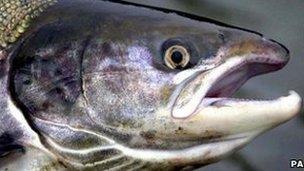Salmon farms 'polluting' lochs in Scotland
- Published

The Scottish salmon farming industry is growing, recording capital investment of nearly £48m last year
Scottish sea lochs are being polluted by salmon farms, according to a report published by the Salmon and Trout Association (S&TA).
The report analysed the levels of sea lice treatment chemical residues - which are used by salmon farmers - in the sea-beds of lochs across Scotland.
Information was obtained under Freedom of Information from the Scottish Environment Protection Agency (Sepa).
The Scottish Salmon Producers' Organisation (SSPO) dispute the report.
S&TA said its findings were "worrying" for wild fish stocks.
The association added that it was also concerned about the impact of juvenile sea lice from the fish farms on emigrating wild salmon and sea trout.
It maintains that the chemicals used to treat the lice are harmful to the wider environmental community.
Regulation plans
The report stated that in some cases, sea lice chemical residues had been higher than is allowed by environmental quality standards (EQS).
Between 2005 and 2010, nearly 13% of sea-bed residue samples from fish farms were in excess of EQS.
The report also stated that in some cases, fish farmers had failed to report data concerning sea lice chemical residues to Sepa.
Between 2005 and 2010, 16% of fish farms failed to supply Sepa with the necessary data, according to the report.
Hughie Campbell Adamson, the chairman of S&TA Scotland, said: "The information from Sepa raises serious concerns over the impact of in-feed sea lice treatments. While the control of sea lice on fish farms is essential, it would not be environmentally responsible to threaten marine shellfish populations as a consequence.
"The only sustainable solution is for closed containment production, which massively reduces the need for farmers to use these toxic sea lice control chemicals, as well as minimising other impacts from salmon farming on wild fish, shellfish and the wider marine environment."
Scott Landsburgh, the chief executive of SSPO, said the data used by S&TA was "misleading" as some of the farms were not in production when the information was collected.
He said: "This is yet another misleading report from the Salmon & Trout Association which takes raw data out of context and speculates on potential impacts to suit its own purposes.
"It is one of an increasing list of highly contentious claims by a campaigner based in England against legitimate users of Scotland's water resources."
The Scottish government is currently undertaking a consultation process on fish farming in Scotland.
The Aquaculture and Fisheries Bill proposes stricter regulation of the fish farm industry.
However, SSPO believe greater regulation will harm the industry and may threaten jobs.
In their response to the government's consultation, Mr Landsburgh said: "The proposed legislation will undoubtedly increase the cost of production and make our industry less competitive at home and abroad.
"It will damage the industry's contribution to Scotland's economy, threaten jobs in rural areas and in the north east, which relies on salmon for processing jobs."
In light of the report Paul Knight, the chief executive of S&TA, claimed regulation would help protect Scotland's wider marine environment.
He said: "It must now be clear that this industry requires stricter regulation in the forthcoming bill and increased scrutiny of the industry by Sepa inspectors."
- Published5 April 2012
- Published7 April 2011
- Published26 January 2011